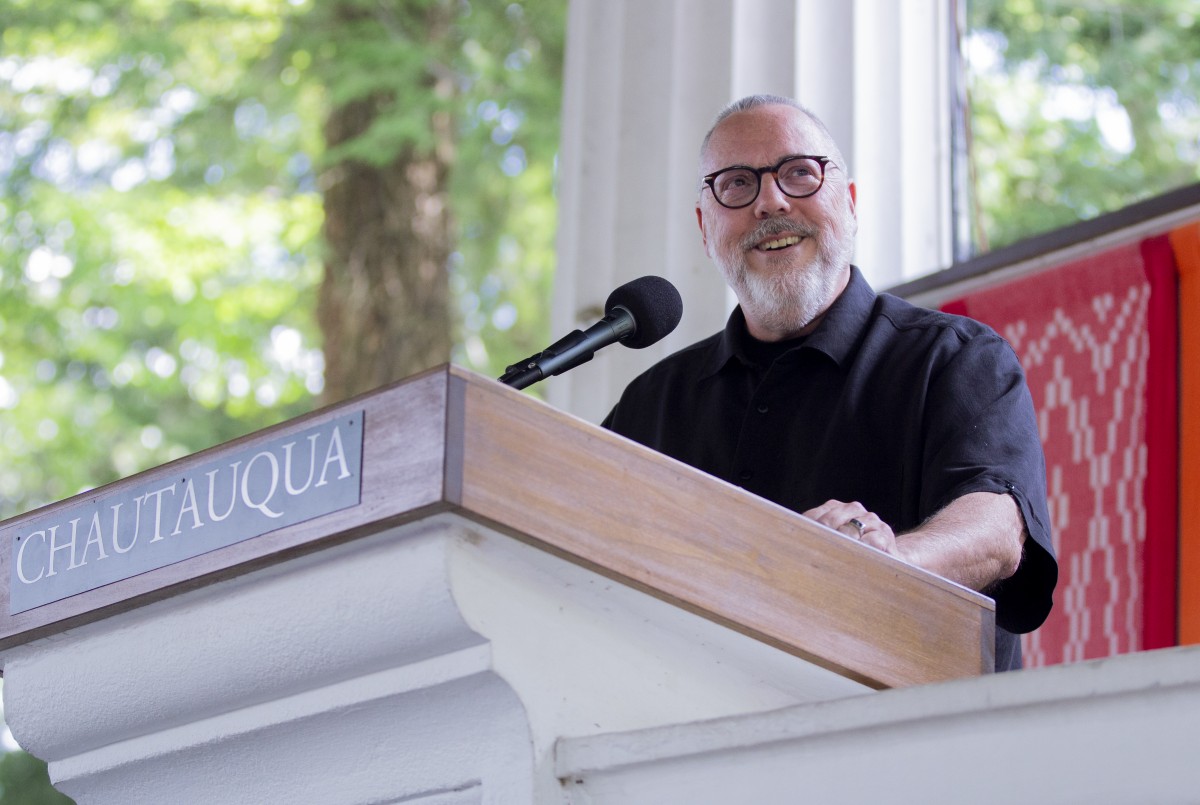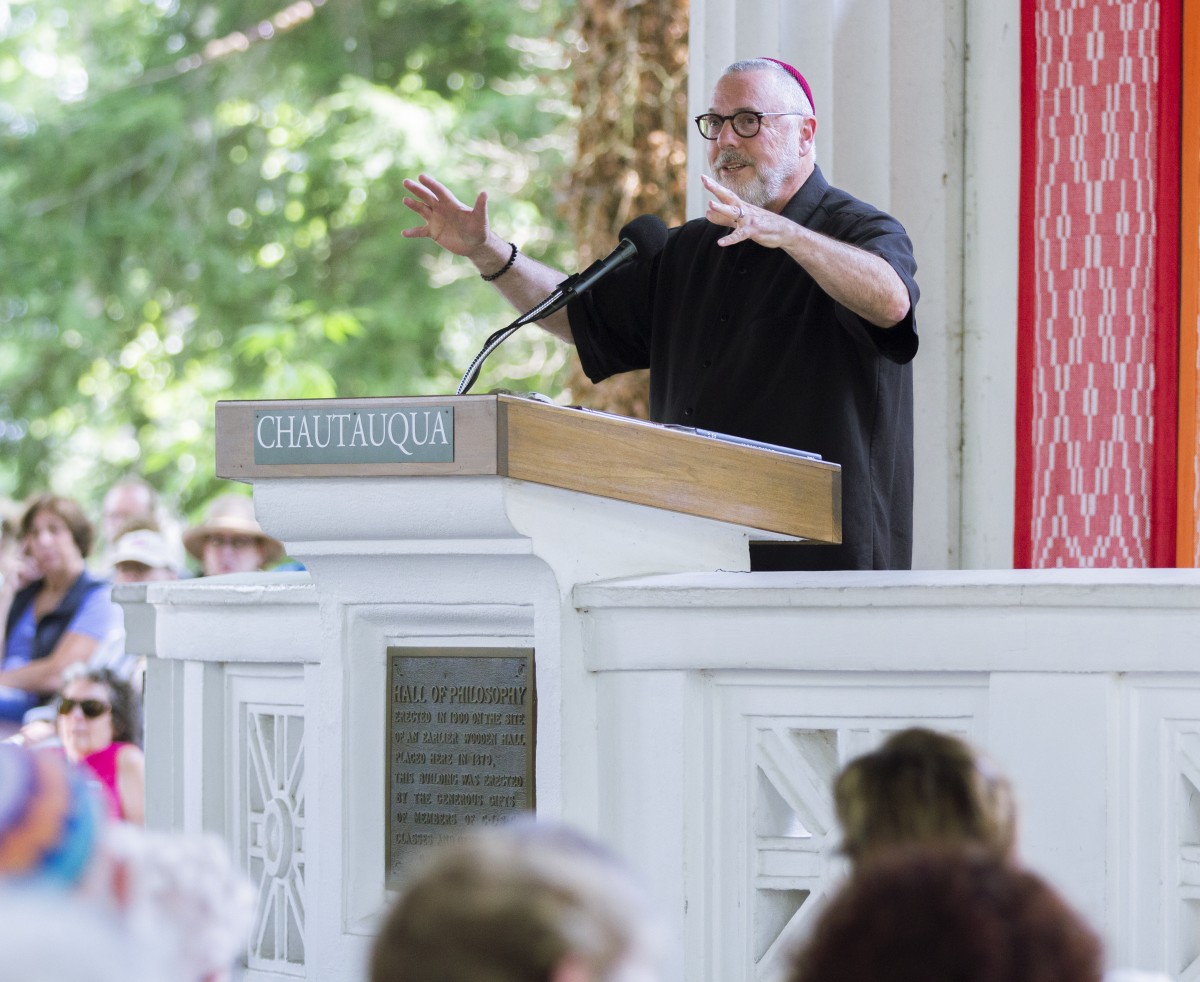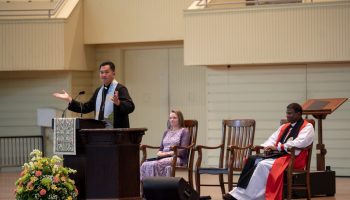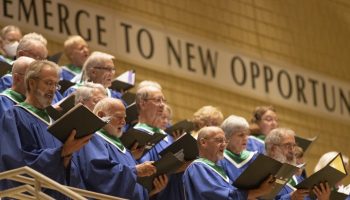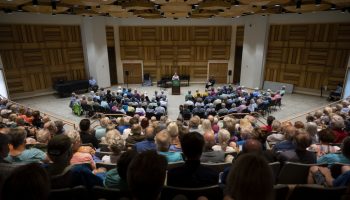Nikhat Noorani, for The Daily
Rabbi Rami Shapiro is not interested in opinions on what grace from God is. Rather, the key to his philosophy on grace is radical liberation, dropping the narratives people surround themselves with in everyday life and accepting — to see divinity and God’s grace in everyone.
Shapiro opened the Week Seven Interfaith Lecture Series on “Grace: A Celebration of Extraordinary Gifts,” with his lecture Monday in the Hall of Philosophy: “God’s Limitless Effervescence: A Jewish Understanding of Grace.”
A Jewish practitioner of perennial wisdom, Shapiro is the author of 36 books, and famously known for his website Dear Rabbi Rami, which showcases the questions that Shapiro has been asked in person or on various media outlets.
When it comes to answering questions, Shapiro said his responses “are short, often blunt and always opinionated.”
“They are not intended to douse the embers of inquiry, but to fan the flames of further investigation,” he said.
A facet he holds true to his conviction, Shapiro encourages exploring avenues of beliefs to see the larger aliveness and, moreover, the notion of grace being from God — no matter what or who God is.
One method he uses to navigate and explore this philosophy is through Hasidic songs, in this case, “I am Alive,” a song from the 1800s translated by Rabbi David Zellern from a teaching from Rebbe Menachem Nachum of Chernobyl. Shapiro emphasized the section, “I am alive I am alive, I’m alive,” followed by the line, “And who is this aliveness I am? And who is this aliveness I am, if not the holy blessed one?”
Shapiro leads the crowd in a song @rabbirami pic.twitter.com/pkA5KDBiJJ
— The Chautauquan Daily (@chqdaily) August 5, 2019
The second line, as Shapiro put it, “questions the affirmation of the first,” further exploring the everlasting aliveness and the dynamic nature of God’s effervescence.
Consider looking at the individual self; there are two ways to see this. The preferred method uses the lens of being a character in a story, and tends to be static and often misses out on the opportunity to be grateful for being alive. The flip side of this, however, is being able to see one’s truer self as a part of the larger aliveness, which has no age, and is something that is everlasting.
Shapiro placed further emphasis on the idea of moving away from seeing just a dichotomy.
“This is how I understand God,” he said. “God is this aliveness.”
Shapiro said people can often have a limited scope of God when they make use of partnerships with God or see God as dualistic.
This is especially apparent in word choice, for example.
“Every time you read the Bible and you read the word ‘Lord,’ you are being misled,” Shapiro said.
This is because in Hebrew, the word “Lord” was originally not used, but instead “Yhvh,” a word with no vowels. The adaptation of the word “Lord” was initiated by rabbis to create a sense of “empowerment” among them. The term is masculine, because originally, only men could be rabbis. Moreover, because the term is hierarchical, it creates a feudalistic approach, implying that rabbis and other clergy are closer to God and all others are “basically serfs,” Shapiro said.
“That ‘Lord’ word is completely misleading, and it robs us of the richness of the Hebrew original,” Shapiro said. “ ‘Yhvh’ (translated as: to be), that is the actual word that you find in the Bible. It’s not a noun; It’s a verb. There are no nouns in the universe, there’s only aliveness happening.”
“The very nature of aliveness is to enliven,” says @rabbirami, “The enlivening of things… is the grace of God.”
— The Chautauquan Daily (@chqdaily) August 5, 2019
Looking to Scripture, Shapiro quoted Isaiah 45:7, which states: “I (Yhvh) form the light, and create darkness: I make peace, and create evil: I the Lord (Yhvh) do all these things.”
Shapiro quoted this to clarify that people limit “grace” to only the blessings they receive.
“But in fact, it’s the whole thing, and that’s troublesome to us,” he said, “because if grace is the whole thing, then God is the whole thing. And again, we like a good God. We want a God who is good, as we define good. … I’m suggesting God isn’t good, God is God. God is reality. God is this aliveness that happens, and part of that aliveness … is stuff we don’t like, and we call it bad.”
This limited scope places a limit on God’s power and on God’s grace. Instead of limiting God, our job is to get to radical liberation.
This is done through looking at a different passage of Scripture. According to Shapiro, it is important to examine Genesis 12:1-3: “The Lord had said to Abram, ‘Go from your country, your people and your father’s household to the land I will show you, … and all peoples on Earth will be blessed through you.’ ”
“When you enter into a mindset that’s free from all these (narratives), you see the universe as it is,” says @rabbirami
— The Chautauquan Daily (@chqdaily) August 5, 2019
The most important part of the command to Abraham and Sarah here is to journey inward. Shapiro suggested that the verse lists the commands to Abraham and Sarah from the easiest to the most difficult things to change: country and citizenship; kinship and ethnicity; and ideology and constricting narratives. By leaving these behind, the aliveness, or God’s grace, will be revealed. Once the state of divine reality is reached and one has accepted this, the end of the Genesis verse comes to fruition, and “you will be a blessing to the world.”
As Shapiro put it, similarly to Fr. Richard Rohr, OFM, in Week Four, for Buddhists, Hindus and Sufis across the board, ideology is the hardest part to overcome — that is, the false narratives people create based on where they come from and what they surround themselves with. No one wakes up in the morning with the intention to be evil. There’s a rationale to it, Shapiro said.
Often people assume their narratives are inherently good or correct, but they won’t find out until they leave their narratives behind, much like the way Sarah and Abraham are commanded to do. In a world where some individuals have narratives forced upon them, it is important to see the divinity in everyone, as Shapiro described, because once they see God in everyone, it is harder to work against them.


